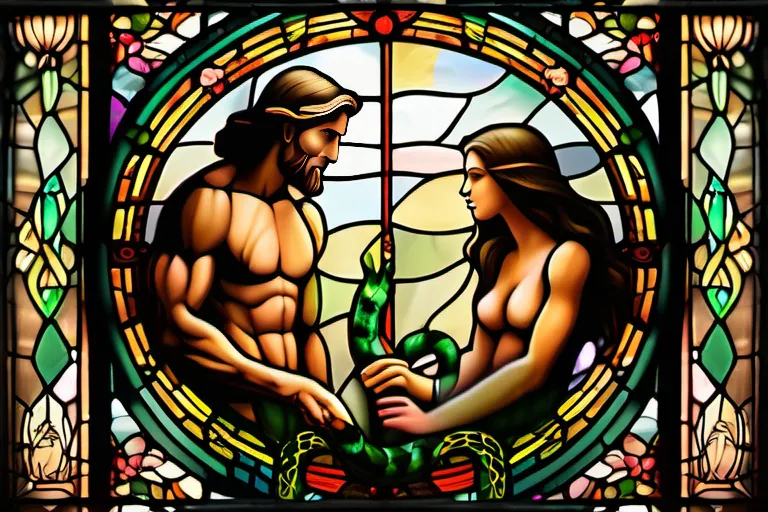Explore the concept of original sin, its origins, implications, and impact on Christian theology.
Original sin is a fundamental doctrine in Christianity that has shaped the faith for centuries. This article delves into the origins, nature, and implications of original sin, providing readers with a deep understanding of this important concept.
The Biblical Account of Original Sin
As we delve into the heart of Christian theology, one concept stands as a cornerstone: original sin. But what exactly does it mean? How did this idea come to be, and why is it so crucial in understanding Christianity?
Let’s turn to the pages of Genesis, where the story of Adam and Eve unfolds like a tapestry woven with threads of temptation and consequence. Why did God create Adam and Eve? Were they meant to resist every test or were they destined for failure from the start? The serpent’s seductive words seem almost like a whisper in the garden, but what does it mean when we say sinnature was introduced into the world through that single act of disobedience?
In this narrative, original sin is often portrayed as a dark stain, slowly seeping into humanity. How did one wrong decision by two people affect an entire race? Is there a way to cleanse oneself from this inherent taint, or is it forever part of human nature? The story of Adam and Eve serves not only as a cautionary tale but also as a profound exploration of free will versus predetermined destiny.
The Nature of Original Sin
So, what exactly is original sin? It’s like asking about the heart of Christianity itself—something that has puzzled theologians and believers for centuries. In essence, original sin refers to a state or condition in which human beings are born, marked by inherited guilt and separation from God due to the fall of our first parents, Adam and Eve. But how do we define this concept more precisely?
Imagine a tree standing tall in the midst of a vast forest; its roots stretch deep into the soil, shaping not just its own growth but that of the entire forest around it. Similarly, original sin acts as the foundational principle that influences every aspect of human existence. It is not simply about breaking rules or making mistakes, but more fundamentally about a broken relationship with God.
In Christian theology, original sin differs from personal sins in a crucial way. While personal sins are the immediate actions and thoughts we commit, original sin is inherited at birth, like a genetic code passed down through generations. It’s not something we consciously choose; it’s more of an inherent condition that affects our very nature.
For example, have you ever wondered why people often fall into patterns of destructive behavior despite knowing better? This can be seen as a manifestation of original sin, where the inherited sin nature causes us to struggle against what is right. It’s as if we’re playing an endless game of chess with one hand tied behind our back, always starting from a disadvantage.
Understanding this concept helps us grasp why Christianity emphasizes the need for redemption and grace through Christ. If original sin is so deeply ingrained in human nature, how can we break free from its hold? This question drives much of Christian theology, leading to discussions about salvation and the role of Jesus as our savior.
The Impact of Original Sin on Humanity
Imagine original sin as a heavy weight that drags down every human being, a shadow that looms over our lives from birth. How does this concept manifest in the daily lives of believers? In what ways does it shape their understanding of themselves and their world?
The effects of original sin are profound and far-reaching, touching almost every aspect of human existence. Perhaps one of the most striking consequences is spiritual death—the separation from God. This idea suggests that without a divine intervention, humanity is destined to wander in a state of alienation from its creator, much like being lost in a vast, dark forest with no map or compass.
But how does one escape this dismal fate? The need for salvation becomes urgent and pressing. It’s as if humanity is trapped in a labyrinth, and the only way out requires guidance from an external source—a savior who can provide the light to illuminate the path towards redemption.
In Christian theology, saving grace is seen as the answer, offered freely through faith in Christ. This grace not only restores the broken relationship with God but also provides a way to overcome the corrupt nature inherited from our first parents. It’s like receiving a new set of wings after having been bound by chains for generations.
The journey towards salvation involves much more than just believing; it requires a transformation, a change in heart and mind, and an active participation in the life of Christ through baptism and communion. This process is often described as a daily struggle against sin, but with the hope that true freedom can be found in the embrace of God.
So, how do believers navigate this complex landscape? They seek solace in scripture, find strength in community, and strive to live out their faith through acts of love and service. Each step forward is a testament to the enduring power of grace and the unwavering hope that salvation truly is possible.
In the end, original sin serves as both a reminder of our fallibility and a call to action—a challenge to rise above our baser instincts and seek the higher purpose offered by a loving God. This narrative isn’t just about accepting failure; it’s about embracing the journey towards becoming more like Christ in every aspect of life.
Original Sin in Christian Theology
How did original sin come to be such a central doctrine in Christian theology? Was it always understood and interpreted in the same way across different branches of Christianity, or is there diversity in how this concept has been approached over time?
Consider the metaphor of a tree: ‘Does not the health of the trunk determine the vitality of the whole tree?’ In much the same way, original sin impacts every branch and leaf of Christian belief. Let’s explore how this doctrine is understood in the Catholic, Protestant, and Orthodox traditions.
In Catholicism, original sin is seen as a hereditary stain that affects all humans, tainting their wills and leaving them in a state of alienation from God. This concept is rooted in the idea that Adam’s disobedience led to a fall not just for him but for all his descendants. Does this mean then, that even those who have never heard about Jesus are condemned because of something that happened in the distant past?
Protestants, on the other hand, often interpret original sin as a total depravity of human nature, believing that humans are so fundamentally flawed that they cannot contribute anything good to their salvation. ‘Can a blind man lead another?’ asks a rhetorical question, highlighting how this doctrine views human capacities and free will.
The Eastern Orthodox Church takes a different approach, emphasizing the concept of ancestral sin rather than original sin. They believe in a collective responsibility for Adam’s actions but hold that each person can overcome this through personal repentance and grace from God. Does this mean that every individual has an opportunity to start anew, despite the weight of past sins?
These differences reflect not just theological nuances but also cultural and historical contexts in which these interpretations emerged. Each branch of Christianity seeks to grapple with the profound question: How does one reconcile human sinfulness with God’s love and mercy? The journey through these perspectives reveals a rich tapestry of thought that continues to influence Christian practices and beliefs.
The Doctrine of Original Sin: Criticisms and Responses
Have you ever wondered why humanity seems to be predisposed towards sin? Is it simply a result of personal choices and free will, or does it stem from something deeper rooted in our very nature? The doctrine of original sin offers one explanation for this phenomenon, but it has faced numerous criticisms over the centuries. Let’s delve into these critiques and see how Christian theologians have responded.
One common criticism is that the concept of original sin seems to hold individuals responsible for something they did not choose or commit themselves—passing down a burden from our first parents Adam and Eve. How fair is it to judge an entire generation based on actions taken millennia ago? Some argue this could undermine individual responsibility and moral agency.
Another criticism centers around the idea that if everyone is born with original sin, then even the most innocent infants are considered sinful from birth. This can lead to a pessimistic view of human nature, which some find difficult to reconcile with God’s love and goodness.
Yet, Christian theologians have provided various responses to these challenges. Some highlight that original sin doesn’t make us inherently evil but rather deprives us of the ability to fulfill our true purpose without divine help. It’s like a seed planted in fertile soil; the environment can stifle its growth and prevent it from reaching its full potential.
Others emphasize the transformative power of grace, suggesting that while original sin affects everyone, it does not ultimately define who we are or what God sees in us. Just as a surgeon operates on a patient to heal them, God intervenes in our lives through His grace to restore and redeem us.
In summary, criticisms of the doctrine of original sin touch upon fundamental questions about justice, free will, and human nature. However, Christian responses offer a nuanced understanding that balances these concerns with the belief in divine intervention and redemption. Whether you find the doctrine comforting or unsettling, it undoubtedly plays a crucial role in shaping our view of humanity and God’s plan for salvation.
Original Sin and Salvation in Christianity
How do we reconcile our sinful nature with the love and grace of God? Is there any way to escape the weight of original sin that seems to follow us like a shadow? These questions have puzzled theologians and believers alike for centuries. In Christianity, the concept of original sin is deeply intertwined with the idea of salvation, and Jesus Christ plays a central role in addressing this issue.
In Christian theology, original sin refers to the inherited sinful nature that humans are born with, stemming from Adam and Eve’s disobedience in the Garden of Eden. This sin taints our every thought and action, making us fall short of God’s glory. But here’s where it gets fascinating: how can something so dark and destructive be reconciled with the light of Christ?
Enter Jesus Christ, the savior. His role is not just to point out our faults but to offer a path to redemption. Through his life, death, and resurrection, he provides a bridge that allows us to overcome the barriers created by original sin. The metaphorical idea of climbing a mountain can help visualize this: Jesus Christ is like a guide who shows you the way up, while your sinful nature might try to pull you down into valleys of despair.
Salvation in Christianity isn’t just about forgiveness; it’s also about transformation. It’s not enough to simply be pardoned for our sins; we must be changed on the inside. This is where faith comes in—it’s the key that unlocks the door to a new life. By embracing Jesus and his teachings, believers can start to climb this spiritual mountain, gradually overcoming their sinful inclinations.
So, how do you begin your journey? It starts with acknowledging the need for help, realizing that without Christ, we cannot reach the summit on our own. Just as a seed needs soil, water, and sunlight to grow into a tree, so too do we need God’s grace to flourish in this sinful world.
Conclusion
 By the end of this article, you will have gained valuable insights into the concept of original sin in Christianity. You’ll understand its role in Christian theology and how it continues to influence religious thought today.
By the end of this article, you will have gained valuable insights into the concept of original sin in Christianity. You’ll understand its role in Christian theology and how it continues to influence religious thought today.











